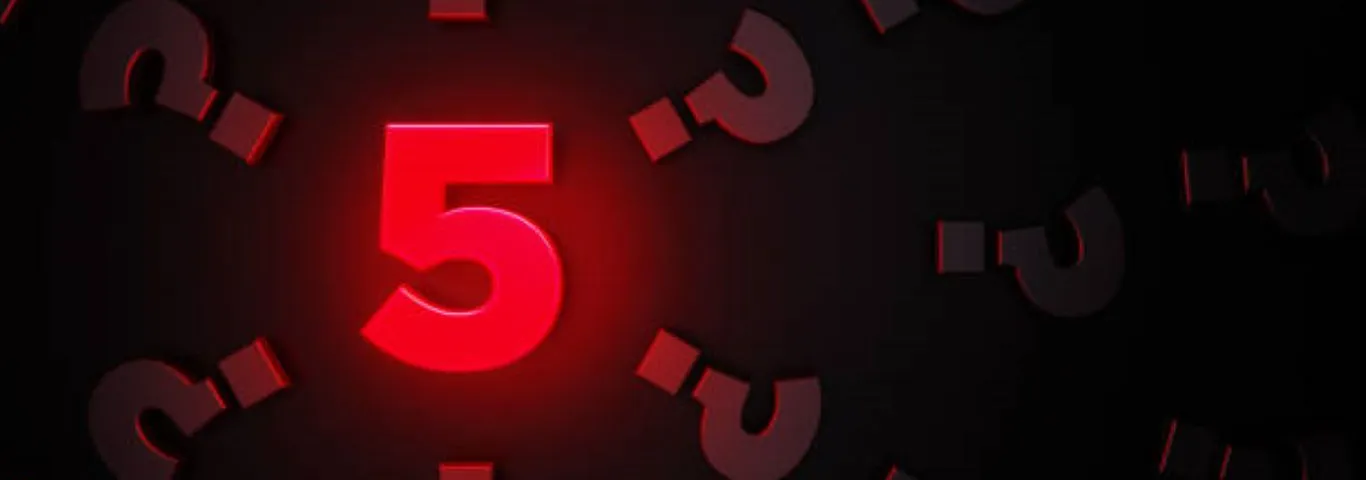
5 Questions at the Weidenbaum Center
An informal series getting to know faculty, staff, and students of the Weidenbaum Center
ANTHONY VALTERRA
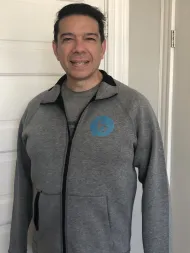
Where were you born? Where are you from? I was born in El Paso Texas. However, my father was in the military and my first years were as a military brat. We eventually settled in Walla Walla, Washington, home of sweet onions, dry wine, and three (yup, three) colleges.
What's the most interesting place you've ever traveled to, and what made it memorable? Helsinki, Finland. It was a jaw dropping place. The museums were extraordinary, the food was magnificent, the people were kind and friendly, and the language completely impenetrable (although everyone spoke English so that wasn't a real problem).
What is a topic you could give a presentation on with no notes? The perils and pleasures of the hobby game industry (think Dungeons & Dragons, Magic: the Gathering, Warhammer 40K, etc.)
What's a trend or story that doesn't get enough attention? The fact that we are living at the beginning of a declining empire. We're learning to raise chickens, fruits, and vegetables in our household - https://www.brunettegardens.com/
What's your go-to 3 pm snack? Nothing tastes better than sleep feels.
JORDAN DUFFIN WONG
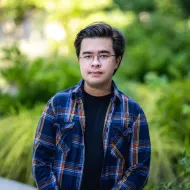
Where were you born? Where are you from? I'm from Kearney, Nebraska. It's a town of about 30,000 people in Central Nebraska, on the Platte River and Interstate 80. Imagine taking a STL suburb like Kirkwood and dropping it in a corn field: that's pretty much Kearney.
What are you studying? I'm in the fourth year of the Political Science PhD program. My mother is a political scientist at the University of Nebraska-Kearney and the proverbial apple got stuck to the tree on the way down. I study a number of topics broadly under the umbrella of "American Politics," including the relationships between rurality, remoteness, and government. I'm also starting work in the space of death and post-death as political phenomena, thinking about how political attitudes and institutions shape the way we handle the care of people who have already died (and vice-versa).
What is a topic you could give a presentation on with no notes? Fun fact: I'm the former Big 10 conference champion in impromptu speaking, which is just giving a presentation with no notes in a competitive setting. The meta-answer then, is a presentation on how to give such a presentation.
What's a trend or story that doesn't get enough attention? Just about anything that the Flatwater Free Press, an independent newsroom in Nebraska, covers. For instance, a really important story they ran in 2022 (and are still covering today), talked about how water treatment negligence in greater Nebraska is contributing to serious public health problems. More broadly, this reflects a trend among national media outlets to reduce "rural America" to some monolithic entity that exists as a strawman for national political problems, and "rural issues" to be some quaint "thing" that is nothing more than a human interest story. Characterizing the rural as a strawman ignores the structure inequality issues facing non-white and non-straight/cisgendered rural Americans.
Whats' your favorite app on your phone? Gonna cheat and pick two: the now-discontinued EA Monopoly app from 2011 and WeCroak, an app that reminds you that you are going to die (along with an "inspiring" quotation) several times per day. Both are excellent.
KEISHA BLANCHARD
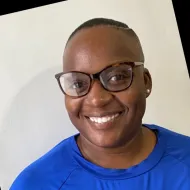
Keisha Blanchard is the Human Resource and Payroll Supervisor for the Human Resource cluster in Arts and Sciences. She handles human resources and payroll duties for the Weidenbaum Center.
Where were you born? Where are you from? Born and raised in St. Louis, MO.
What has been one of your favorite events at the Center? I was invited to a staff lunch at the Whittemore House. Beautiful space, delicious food, and the servers were so friendly and professional.
What’s the most interesting place you've ever traveled, and what made it memorable? San Juan Puerto Rico. I went last February, around my birthday, and the weather was 80 degrees there. It felt amazing to wear shorts in the winter.
What's the best book you've read recently? Disruptive Thinking by Bishop T.D. Jakes
What's a trend or story that doesn't get enough attention? The St. Louis City Reparations Commission.
MICHAEL OLSON
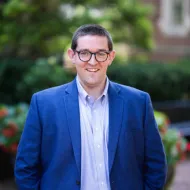
Michael Olson, is an assistant professor in the Department of Political Science and a Weidenbaum Center Resident Fellow. His research and teaching focus on ow electoral and legislative institutions affect legislative representation in the United States. His work draws on a wide variety of data from across American history and different levels of government.
Where were you born? Where are you from? I was born in Geneva, IL (outside Chicago), but grew up in Port Washington, WI (outside Milwaukee).
What is your area of research? How has the Weidenbaum Center supported your research? I study American legislative and electoral politics, with a particular focus on historical data and settings. Weidenbaum Center funding has allowed me to hire research assistants to help with the labor and time- intensive work associated with my research, and additionally providing funding for a research project surveying local government officials.
What’s a talent or hobby you have that not many people know about? While I don't get to do it as often as I'd like, I really enjoy fishing, especially fly-fishing.
What's the best book you've read recently? The Power and the Glory by Graham Greene. It's about a Catholic priest being hunted during revolutionary times in southern Mexico. Completely tranported me to a time/place that I wasn't at all familiar with.
What's a trend or story that doesn't get enough attention? Protected Bike Lanes. In terms of quality of life and climate improvement in urban areas, its hard for me to think of anything more impactful than replacing cars with bikes, and protected bike lanes (just with like a concrete curb between cars and bikes), are a cheap and easy way to make biking safe and desirable.
ARIELA SCHACHTER
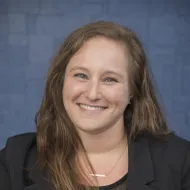
Ariela Schachter, is an Associate Professor of Sociology, Associate Director of the Weidenbaum Center, Executive Committee member of the Weidenbaum Center, and Faculty Affiliate in Asian American Studies. Her research focuses on immigration, race relations, and inequality in the United States. Her current research efforts focus on projects on public attitudes towards immigrants; racial/ethnic relations; and neighborhood selection and residential inequality. She primarily uses experiment and causal inference methods. Professor Schachter additionally uses big data and computation text analysis in her work.
Where were you born? Where are you from? Born in San Diego, CA and grew up in Southern California and later New Jersey.
What’s a talent or hobby you have that not many people know about? I loved to bake.
What’s the best book you’ve read recently? I loved the new Abraham Verghese book (The Covenant of Water)
What's a trend or story that doens't get enough attention? I might be biased because of my research, but I don't think we are paying nearly enough attention to the lack of due process for migrants seeking asylum at the southern border.
What's your favorite app on your phone? I use my NYTimes app every day to wordle..and read the news
ALANA BAME
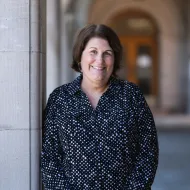
Alana Bame, Alana is the administrative coordinator for the Weidenbaum Center. She works on Center public outreach event planning and related logistics, Center website maintenance, media relations, and associated Weidenbaum Center informational materials. She additionally works with the Associate Director of Research and Administration to support donor relations, donor engagement activities, Eliot Society Weidenbaum Center committees, and related donor requests. She handles many of the day-to-day administrative tasks for the Center including but not limited to assistance with conference room scheduling, onboarding of new Weidenbaum Center staff, faculty, and others, and general office maintenance issues.
Where were you born? Where are you from? Born in Red Bank, NJ. Grew up in Northern Virginia and lived many years in the District of Columbia.
What has been one of your favorite events at the Center? I really liked the Women's Networking Luncheon and Public Policy event featuring Betsy Sinclair and Monica Eppinger.
What’s the most interesting place you've ever traveled to, and what made it memorable? Reykjavik, Iceland. Was a memorable experience as I was there when it is light 24 hours a day. Definitely nice to have more hours in the day to see the truly beautiful natural landscapes and scenery, and appreciate the hot springs/baths.
What is a topic that you could give a presentation on with no notes? Dealing with a loved one with dementia.
What's your favorite band/musician? What's your karoke song? I don't really have a favorite bank but like Bill Withers, America, and Wings. Karoke is not my thing.
STEVEN FAZZARI
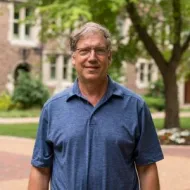
Steven Fazzari, Bert A. and Jeanette L. Lynch Distinguished Professor of Economics and Professor of Sociology. Steve is the former Weidenbaum Center Director and a current Resident Fellow at the Center. Fazzari is an economist and has been a faculty member at Washington University for over 35 years. Following decades of work in the Department of Economics and as then Associate Director of the Weidenbaum Center, Fazzari devoted an incredibly rewarding five years as inaugural chair of the revived Department of Sociology. He recruited 10 faculty members and worked with his new colleagues to create undergraduate and graduate programs. Fazzari continues to be an active part of Sociology and is committed to interdisciplinary teaching, research, and student mentorship that connects sociology with economics.
Where were you born? Where are you from? Grew up (mostly) in Racine, Wisconsin
What is your area of research? How has the Weidenbaum Center supported your research? Macroeconomics. The Center has provided useful fund for many research projects over the years including work that connects rising inequality with economic growth.
What’s a talent or hobby you have that not many people know about? I loved backpacking for many years, although both time and aging have kept out of the mountains in recent years. I played the accordion when I was young and now I am studying piano.
What’s the best book you’ve read recently? My reading these days is all for research. Too bad. I would like to get back to novels.
What is a topic that you could give a presentation on with no notes? Most any topic in macroeconomics (sources of economic growth, causes and consequences of recessions, fiscal and monetary policy)